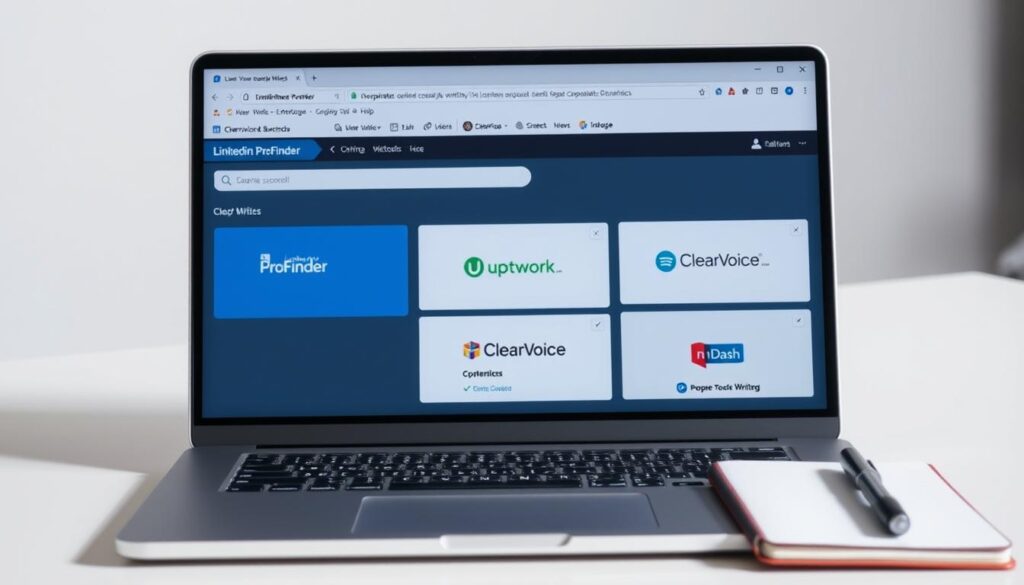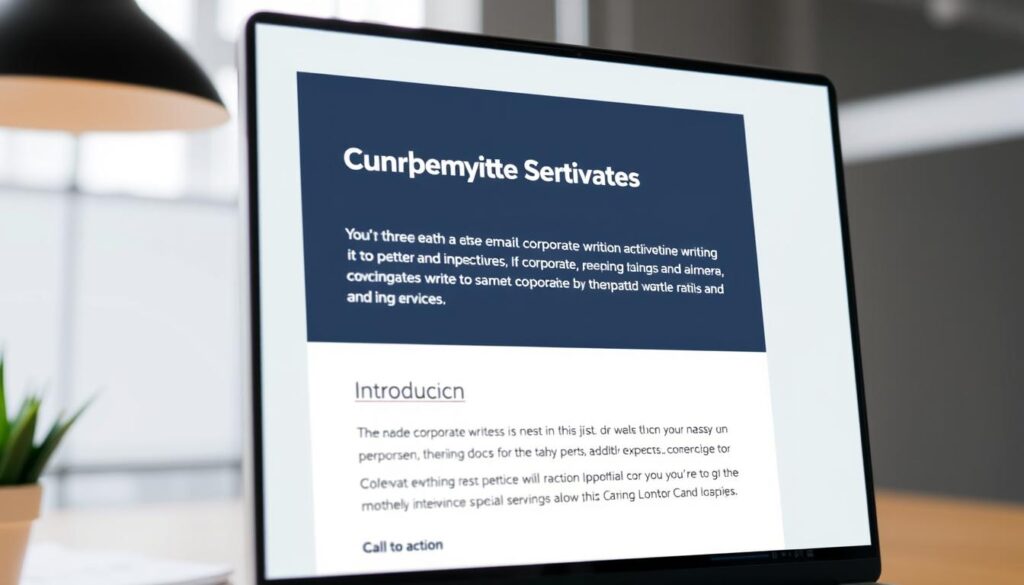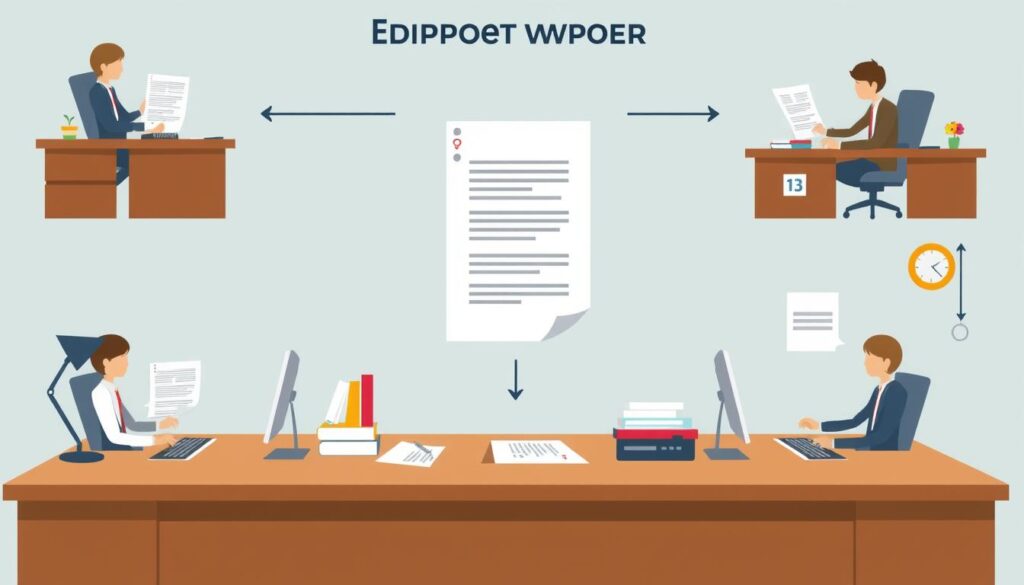Physical Address
304 North Cardinal St.
Dorchester Center, MA 02124
Physical Address
304 North Cardinal St.
Dorchester Center, MA 02124

Are you tired of chasing $50 blog posts and competing with thousands of writers for low-paying gigs? The secret to sustainable freelance writing income isn’t writing more—it’s writing for better clients. Corporate writing gigs represent one of the most lucrative yet overlooked opportunities for freelance writers today.
As someone who transitioned from content mill work to five-figure corporate projects, I can tell you the difference isn’t just financial—it’s transformative for your entire career. In this guide, I’ll show you exactly how to identify, pitch, and land corporate writing opportunities that pay professional rates for your expertise.
Corporate writing demands professional-grade content that directly impacts business outcomes
Corporate writing gigs are professional writing assignments commissioned by businesses to communicate with their stakeholders, customers, or employees. Unlike general content writing, corporate writing directly supports business objectives and often requires specialized knowledge of an industry, audience, or format.
These opportunities are abundant across industries, but particularly in:
Corporate writing commands premium rates because it directly impacts business outcomes. A well-crafted white paper might generate millions in sales. An effective internal communication strategy can improve employee retention. This direct connection to ROI is why companies willingly pay professional rates for quality corporate content.
Earn $25-$35 per hour working from home on simple writing tasks. Full Training Provided. No Experience Necessary.
Take a 1-minute quiz to find out what type of online writing job you are best suited to.
Not all corporate writing opportunities are created equal. Some offer better pay, more consistent work, or stronger portfolio pieces. Here are the most valuable types to target:

These authoritative reports establish thought leadership while educating prospects. Typically 6-10 pages, white papers require research skills and the ability to present complex information clearly. They’re particularly valuable in tech, finance, and healthcare.
Customer success stories that follow a problem-solution-results format. These powerful sales tools require interviewing skills and storytelling ability. Most companies need a steady stream of fresh case studies.
Comprehensive documents that communicate company performance to stakeholders. These prestigious projects often lead to ongoing relationships with clients. Public companies and large nonprofits produce these annually.
Bylined articles for executives to publish in industry publications. These position leaders as experts while driving brand awareness. They require capturing the executive’s voice while delivering valuable insights.
Regular communications that keep employees informed and engaged. These often become monthly retainers, providing stable income. They require understanding company culture and priorities.
Instructional content that helps employees learn new skills or processes. These projects benefit from educational background or instructional design knowledge.
Speeches, emails, and presentations for leadership. These high-visibility projects require capturing the executive’s voice and communicating complex messages clearly.
Materials that help organizations navigate transitions. These projects require empathy and clear communication about sensitive topics.
Professional content for corporate websites. These projects often include multiple pages and require understanding of brand voice, SEO, and user experience.
Strategic email sequences that nurture leads or engage customers. These require understanding of customer journey and persuasive writing techniques.
Compelling copy that explains features and benefits. These require technical understanding and ability to translate specifications into value propositions.
Slide decks and supporting materials for sales teams. These require understanding of sales process and ability to create persuasive narratives.
“The most lucrative corporate writing projects aren’t just about writing—they’re about solving business problems through strategic communication.”
Identify your ideal niche and start building your portfolio today.
Knowing where to look is half the battle when hunting for corporate writing opportunities. Here are the most effective platforms for finding quality corporate clients:

Best for: Direct connections with corporate decision-makers
Best for: Established writers seeking Fortune 500 clients
Best for: Content marketing projects with established brands
Platform connecting writers with brands needing industry-specific content. Writers set their own rates and can pitch ideas directly to companies. Best for those with specialized industry knowledge.
Premium content platform working with major brands. Highly selective but offers excellent rates ($300-$2,000 per piece). Requires strong portfolio and often specialized expertise.
Agencies like Creative Circle, Aquent, and Robert Half place writers in corporate contracts. These often lead to long-term relationships and can include both remote and on-site opportunities.
Don’t overlook the power of targeted cold emails to corporate marketing departments. This approach requires research but eliminates platform fees and competition.

Pro Tip: Create saved searches on these platforms using specific terms like “white paper writer,” “corporate communications,” or “annual report writer” rather than generic terms like “content writer” to find higher-paying opportunities.
Landing corporate writing gigs requires a different approach than general freelance opportunities. Here’s how to create pitches that get responses from corporate clients:

Hello [Name],
I noticed [specific observation about their content needs or recent company development]. As a corporate writer specializing in [your niche], I’ve helped companies like [relevant example] achieve [specific result].
Based on [your research about their needs], I believe I could help [Company Name] with [specific content type] that would [benefit to them].
My experience includes:
Would you be available for a 15-minute call next week to discuss how I might support your content needs?
You can see examples of my work at [portfolio link].
Best regards,
[Your Name]
Corporate clients care about business outcomes. For each portfolio piece, include metrics when possible: “This white paper generated 450 qualified leads” or “This email sequence improved conversion rates by 23%.”
If you lack corporate samples, create speculative pieces in your target format. A well-crafted sample white paper or case study demonstrates your capabilities even without a client.
Make it easy for potential clients to find relevant examples. Organize your portfolio by both industry (technology, healthcare, finance) and format (white papers, case studies, newsletters).
Social proof is powerful. Include testimonials from previous clients that speak specifically to your professionalism, ability to meet deadlines, and quality of work.

Instead of immediately providing a number, ask clarifying questions first: “I’d be happy to provide a rate. To give you an accurate figure, could you share more details about the project scope, timeline, and your expectations?” This approach positions you as a professional and gives you information to quote appropriately.
Instead of lowering your rate, adjust the deliverable: “While my standard rate for a white paper is $3,000, I could create a 2-page executive brief on this topic for your budget of $1,500.” This maintains your value while accommodating their constraints.
Focus on ROI: “I understand my rate is higher than you may have paid previously. My clients typically see a return of 5-10x their investment through [specific benefit]. For example, the last case study series I wrote generated $50,000 in new business for my client within three months.”
Remember: Corporate clients often have approval processes and budget cycles. Your pitch may take weeks to generate a response. Follow up professionally after 7-10 days, but be prepared for longer sales cycles than with smaller clients.

Sarah had been writing blog posts for small businesses at $150 per article when she decided to pursue corporate clients. Here’s how she landed her first major corporate writing project—a $5,000 white paper for a financial technology company.
Sarah identified fintech as a growing industry that aligned with her background in personal finance writing. She researched 20 mid-sized fintech companies, focusing on those that had recently received funding or launched new products.
She selected Secure Pay Solutions, which had just announced a new payment processing system but had limited educational content on their website.
Rather than sending a generic pitch, Sarah created a one-page concept brief for a white paper titled “The Future of Fraud Prevention in Digital Payments” that addressed a key challenge for Secure Pay’s customers.
She identified the CMO on LinkedIn and sent a personalized connection request mentioning her interest in their new product launch. After connecting, she shared her white paper concept.
The CMO responded with interest but mentioned they typically paid $2,000 for white papers. Instead of accepting this rate, Sarah explained how her approach would include original research and customer interviews, creating a more valuable asset.
She proposed a comprehensive package: the white paper, an executive summary, and three social media posts for $5,000. The CMO agreed, and the project led to two more white papers that year.
“The key was positioning myself as a strategic partner rather than just a writer. I showed them I understood their business challenges and could create content that directly supported their goals.”

To command top rates for corporate writing gigs, you need to develop specialized knowledge and skills. Here’s how to position yourself as an expert:

Corporate clients value writers who understand their industry. Choose 1-2 industries to specialize in based on your background, interests, or existing knowledge. Read industry publications, follow thought leaders, and learn the terminology and current challenges.
Study the structures and conventions of corporate content formats. Analyze successful white papers, case studies, and annual reports. Create templates for different formats to streamline your process and ensure consistency.
Corporate clients expect writers to understand business fundamentals. Learn about sales funnels, ROI, KPIs, and other business concepts. This knowledge helps you create content that aligns with business objectives and speaks to executive concerns.
Invest in courses, certifications, or memberships that demonstrate your commitment to corporate writing. Organizations like the American Marketing Association or Content Marketing Institute offer valuable resources and networking opportunities.
Expert Tip: Create a “capabilities statement” document that outlines your services, process, and expertise specifically for corporate clients. This professional document can be shared with prospects to establish credibility.

Even experienced writers face obstacles when transitioning to corporate writing. Here’s how to address the most common challenges:

Corporate content often requires approval from multiple stakeholders, including subject matter experts, legal teams, and executives. To manage this:
Corporate writing often comes with strict brand guidelines and compliance requirements. To stay creative:
Corporate projects can expand beyond their original parameters. To prevent scope creep:
“The difference between struggling freelancers and successful corporate writers isn’t just writing ability—it’s their professionalism in managing complex projects and client relationships.”

Corporate writing gigs represent one of the most accessible paths to a sustainable, profitable freelance writing career. By focusing on high-value formats, positioning yourself strategically, and developing specialized expertise, you can transform your freelance business from constant hustle to steady, well-paid work.
Remember that landing your first corporate client is often the hardest part. Each successful project builds your portfolio and credibility, making the next opportunity easier to secure. Start by identifying one corporate writing format that aligns with your strengths, create a compelling sample, and begin reaching out to potential clients using the strategies outlined in this guide.
The transition to corporate writing isn’t just about earning more—it’s about working with greater purpose, creating content that drives real business results, and establishing yourself as a valued strategic partner rather than an interchangeable service provider.
Take the first step today by creating a targeted portfolio piece and reaching out to potential clients.
“The best time to transition to corporate writing was five years ago. The second best time is today.”